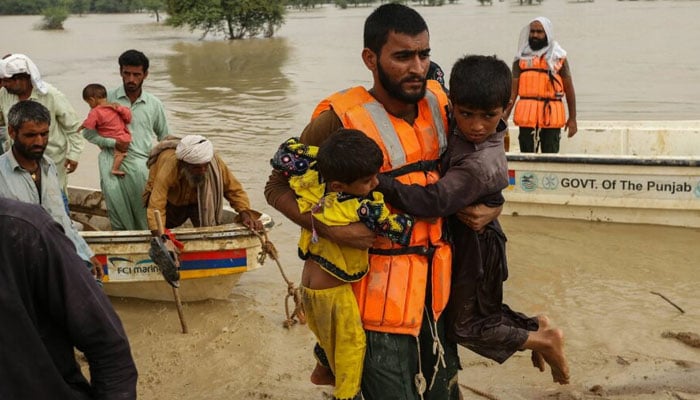Financial institutions advised on spending for environment, human rights
Financial institutions in Pakistan are evolving to meet the environmental, social and governance (ESG) criteria
Chief risk officers and banking managers of 26 commercial banks and the executive team of the State Bank of Pakistan came together to develop a comprehensive understanding of the Financial Finance Guide International (FFGI) methodology on Saturday.
The FFGI Methodology assesses financial institutions’ approach to sustainability across 21 themes. Financial institutions in Pakistan are evolving to meet the environmental, social and governance (ESG) criteria, however, currently their policies remain silent on the scope and measures to limit ESG-related risks based on the international standards defined by the FFGI methodology.
Pakistani commercial banks have gaps in content and scope of policy commitments in their internal operations and the companies they invest in or finance. The purpose of the meeting was to make sure that financial institutions bring their policies and measurable due diligence protocols for the investee companies in the public domain to maintain transparency.
The information will build an understanding of the depositors to know how their money is contributing to environmental and economic growth in Pakistan. The meeting was organised by the Fair Finance Pakistan, which is a member of Fair Finance Asia and Fair Finance International and seeks to strengthen the commitment of financial institutions in Pakistan to social, environmental and human rights standards.
The FFGI methodology is active in 36 countries of Asia, Europe, Latin America and refers to over 422 international standards and criteria including Equator Principles, International Labour Organization and Organization for Economic Corporation and Development guidelines, UN Guiding Principles on Business and Human Rights to assess financial institutions across a range of themes including corruption, nature, climate change, gender available in the public domain.
The methodology comprehensively explains whether financial institutions have measurable action plans and agree on due diligence for companies they invest in or finance. The FFGI methodology assesses whether financial institutions have checklists in place to evaluate if the investee companies have fair tax practices and fulfil all income tax requirements, and whether or not the companies ensure minimum wages in labour practices.
The methodology also assesses if financial institutions have measures to ensure company policies are in place to reduce emissions in their production phase and utilise necessary technology to reduce fumes in the air. Financial institutions' role is central to reducing air pollution.
Banking sector leaders from public and private sector banks including HBL, Allied Bank, UBL, MCB, Meezan, National Bank of Pakistan, Askari Bank, Bank of Punjab, Sindh Bank, Standard Chartered, Samba, JS Bank, Al Barkah, Al Habib, Bank Alfalah, Bank Islami, Bank Makramah, Bank of Khyber, Dubai Islamic, Faysal Bank, First Women bank, Habib Metropolitan, MCB Islamic Bank, Silk Bank, Sindh Bank, Zarai Taraqiati bank attended the meeting.
-
 Andrew Mountbatten-Windsor Throws King Charles A Diplomatic Crisis
Andrew Mountbatten-Windsor Throws King Charles A Diplomatic Crisis -
 Barack Obama Hails Seahawks Super Bowl Win, Calls Defense ‘special’
Barack Obama Hails Seahawks Super Bowl Win, Calls Defense ‘special’ -
 Pregnant Women With Depression Likely To Have Kids With Autism
Pregnant Women With Depression Likely To Have Kids With Autism -
 $44B Sent By Mistake: South Korea Demands Tougher Crypto Regulations
$44B Sent By Mistake: South Korea Demands Tougher Crypto Regulations -
 Lady Gaga Makes Surprising Cameo During Bad Bunny's Super Bowl Performance
Lady Gaga Makes Surprising Cameo During Bad Bunny's Super Bowl Performance -
 Paul Brothers Clash Over Bad Bunny's Super Bowl Performance
Paul Brothers Clash Over Bad Bunny's Super Bowl Performance -
 South Korea: Two Killed As Military Helicopter Crashes During Training
South Korea: Two Killed As Military Helicopter Crashes During Training -
 Elon Musk Unveils SpaceX’s Moon-first Strategy With ‘self Growing Lunar City’
Elon Musk Unveils SpaceX’s Moon-first Strategy With ‘self Growing Lunar City’ -
 Donald Trump Slams Bad Bunny's Super Bowl Performance: 'Absolutely Terrible'
Donald Trump Slams Bad Bunny's Super Bowl Performance: 'Absolutely Terrible' -
 Jake Paul Criticizes Bad Bunny's Super Bowl LX Halftime Show: 'Fake American'
Jake Paul Criticizes Bad Bunny's Super Bowl LX Halftime Show: 'Fake American' -
 Prince William Wants Uncle Andrew In Front Of Police: What To Expect Of Future King
Prince William Wants Uncle Andrew In Front Of Police: What To Expect Of Future King -
 Antioxidants Found To Be Protective Agents Against Cognitive Decline
Antioxidants Found To Be Protective Agents Against Cognitive Decline -
 Hong Kong Court Sentences Media Tycoon Jimmy Lai To 20-years: Full List Of Charges Explained
Hong Kong Court Sentences Media Tycoon Jimmy Lai To 20-years: Full List Of Charges Explained -
 Coffee Reduces Cancer Risk, Research Suggests
Coffee Reduces Cancer Risk, Research Suggests -
 Katie Price Defends Marriage To Lee Andrews After Receiving Multiple Warnings
Katie Price Defends Marriage To Lee Andrews After Receiving Multiple Warnings -
 Seahawks Super Bowl Victory Parade 2026: Schedule, Route & Seattle Celebration Plans
Seahawks Super Bowl Victory Parade 2026: Schedule, Route & Seattle Celebration Plans




